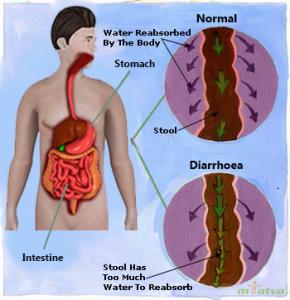Contents
What is Diarrhoea?
Diarrhoea means that you have loose, watery stools more than three times in one day. You may also have cramps, bloating, nausea and an urgent need to have a bowel movement.
There are three clinical types of diarrhoea:
-
Acute watery diarrhoea- lasts several hours or days, and includes cholera,
-
Acute bloody diarrhoea- also called dysentery and
-
Persistent diarrhoea lasts- 14 days or longer
Acute is more common.

Recovery Time
-
Most cases of diarrhoea clear up after a few days without treatment.
- In adults, it usually improves after two to four days. In children, it often lasts slightly longer, between five and seven days.
Diagnosis
Successful treatment depends on diagnosing the cause. Investigations may include:
-
Medical history
-
Physical examination
-
Blood tests
-
Laboratory analysis of stool sample
-
Colonoscopy (the insertion of a slender instrument into the anus so that the doctor can look at the bowel lining)
FAQs prepared by doctor
Q1. Why is diarrhoea dangerous?When a person gets diarrhoea, the body begins to lose a lot of water and salts – both of which are necessary for life. If the water and salts are not replaced fast, the body starts to "dry up" or get dehydrated. Severe dehydration can cause death.
If dehydration is not treated, it can cause death. If it is treated in time, recovery is usually complete.
Symptoms of moderate to severe dehydration include:
- Low blood pressure
- Fainting
- Severe muscle contractions in the arms, legs, stomach, and back
- Convulsions
- A bloated stomach
- Heart failure
- Sunken fontanelle – soft spot on a infants head
- Sunken dry eyes, with few or no tears
- Skin loses its firmness and looks wrinkled
- Lack of elasticity of the skin (when a bit of skin lifted up stays folded and takes a long time to go back to its normal position)
- Rapid and deep breathing – faster than normal
- Fast, weak pulse
- Oral Rehydration Salts does not stop the diarrhoea, but it replaces the lost fluids and essential salts thus preventing or treating dehydration and reducing the danger
- Notable points regarding oral rehydration solution:
- The home-made solution is adequate in most causes. If the diarrhoea is severe, ask your chemist for a special packet of Oral Rehydration Salts. Follow the instructions on the packet carefully.
- Drink sips of the ORS (or give the ORS solution to the conscious dehydrated person) every 5 minutes until urination becomes normal. (It is normal to urinate four or five times a day.)
- Adults and large children should drink at least 3 quarts or liters of ORS a day until they are well.
- If you are vomiting, continue to try to drink the ORS. Your body will retain some of the fluids and salts you need even though you are vomiting.
- Remember to take sips of liquids slowly.
- If you have diarrhoea, continue to drink the ORS. The fluids will not increase the diarrhoea.
- Someone with symptoms of severe dehydration needs to go to an emergency room or other health care facility to get intravenous fluids (fluids given directly into the veins through a needle) if possible. If able to drink, he or she should also drink the ORS.
- Feeding, especially breastfeeding should not be stopped because of diarrhoea. Even if the diarrhoea continues or the child is vomiting, some of the nutrients are being absorbed. Breastfeeding is particularly beneficial because breast milk is easily digestible. It also contains protective substances which help to overcome the infection causing the diarrhea.
- Suitable food should not be withheld, as the child may become malnourished. Once the diarrhoea episode has passed, the child should be given more food than usual to make up for losses during diarrhoea.
Visitor Rating: 5 Stars